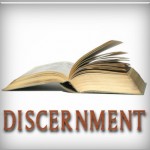Discernment, the Bereans, and Scripture

As I said in a previous post, I’m working my way through a series on the role of discernment when the church gathers together. (See the “Introduction” post here.) I’ve also stated already that I believe that discernment is the work of those who are gifted at “distinguishing between spirits,” but it is also the work of those who are not gifted in that way. Similarly, I pointed out that discernment is part of the edifying process that occurs while the church gathers together.
For the last two posts in this series, I want to highlight a couple of examples of discernment that we find in Scripture. The first example is found in Acts 17:
The brothers immediately sent Paul and Silas away by night to Berea, and when they arrived they went into the Jewish synagogue. Now these Jews were more noble than those in Thessalonica; they received the word with all eagerness, examining the Scriptures daily to see if these things were so. Many of them therefore believed, with not a few Greek women of high standing as well as men. (Acts 17:10-12 ESV)
In this case, the Bereans were not judging “prophecy” in the sense that we read about in 1 Corinthians 14. Instead, they were discerning the good news that Paul and Silas was proclaiming in the synagogue. The “received” the message that Paul and Silas spoke, then checked it against what they read in Scripture. Some of those who weighed this message “believed,” while, apparently, some did not believe.
If we remember that at this time the Jews in Berea would not have owned a personal copy of the Scriptures, we can get a better idea what was happening. Obviously, they would have had to gather together in order to “examine” Scripture and compare that to the message proclaimed by Paul and Silas.
Similarly, we should not forget that Luke tells us that this examination happened “daily.” This was not a once-per-week synagogue service, but a daily gathering in order to check the verity of the good news concerning Jesus Christ. (By the way, this kind of daily gathering is more in line with other historical accounts that shows the synagogue as more of a gathering for community and social activities.)
In a similar incident, when believers gathered together in Jerusalem and discussed whether or not it was valid to teach that Gentiles must be circumcised and keep the law in order to be saved (Acts 15:6-21), Luke lists several methods of discernment. James, for example, turns to Scripture, like the Bereans mentioned above. Luke writes:
After they finished speaking, James replied, “Brothers, listen to me. Simeon has related how God first visited the Gentiles, to take from them a people for his name. And with this the words of the prophets agree, just as it is written, ‘After this I will return,and I will rebuild the tent of David that has fallen;I will rebuild its ruins, and I will restore it, that the remnant of mankind may seek the Lord, and all the Gentiles who are called by my name, says the Lord, who makes these things known from of old.’ Therefore my judgment is that we should not trouble those of the Gentiles who turn to God… (Acts 15:13-19 ESV)
James remarks that Simeon’s (Peter’s) experience matches up with what he had read in “the Prophets” (part of the Hebrew Scriptures).
Thus, in these two examples, we see people turning to Scripture to help them in discernment. (Of course, in both of those examples, the people were turning to the Old Testament Scriptures.) This does not mean, however, that Scripture always has all of the answers that we need in discernment. In the next post, we look at other examples where believers do not rely on Scripture to help them discern what God is telling them.
What are some of the benefits of using Scripture to help us discern what God is communicating with us? What are some dangers of using Scripture?
—————————————
Series on Discernment
Prelude: Let the Others Weigh what is Said…
1. Test Everything: The role of discernment when the church gathers (Introduction)
2. Discernment: A gift of the Spirit and the work of all
3. Discernment: Part of the edifying process of the church gathering
4. Discernment, the Bereans, and Scripture
5. Discernment when Scripture doesn’t Answer our Questions
